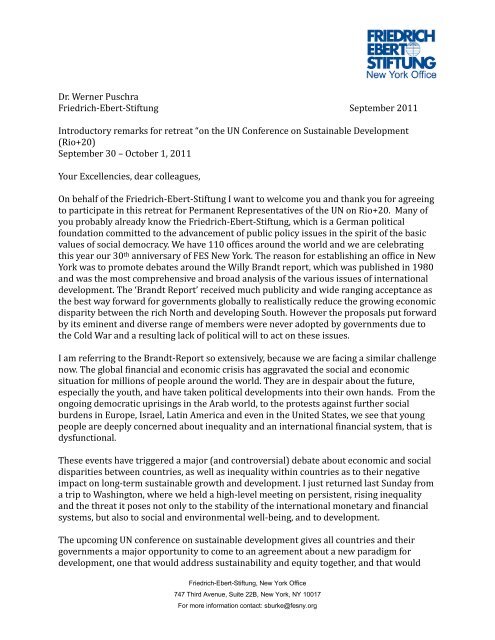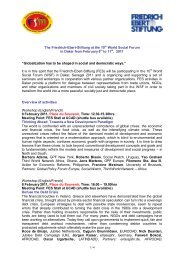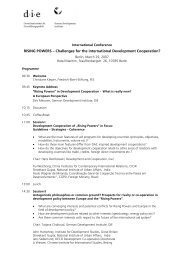Dr. Werner Puschra Friedrich-Ebert-Stiftung September 2011 ...
Dr. Werner Puschra Friedrich-Ebert-Stiftung September 2011 ...
Dr. Werner Puschra Friedrich-Ebert-Stiftung September 2011 ...
You also want an ePaper? Increase the reach of your titles
YUMPU automatically turns print PDFs into web optimized ePapers that Google loves.
<strong>Dr</strong>. <strong>Werner</strong> <strong>Puschra</strong><br />
<strong>Friedrich</strong>-<strong>Ebert</strong>-<strong>Stiftung</strong> <strong>September</strong> <strong>2011</strong><br />
Introductory remarks for retreat “on the UN Conference on Sustainable Development<br />
(Rio+20)<br />
<strong>September</strong> 30 – October 1, <strong>2011</strong><br />
Your Excellencies, dear colleagues,<br />
On behalf of the <strong>Friedrich</strong>-<strong>Ebert</strong>-<strong>Stiftung</strong> I want to welcome you and thank you for agreeing<br />
to participate in this retreat for Permanent Representatives of the UN on Rio+20. Many of<br />
you probably already know the <strong>Friedrich</strong>-<strong>Ebert</strong>-<strong>Stiftung</strong>, which is a German political<br />
foundation committed to the advancement of public policy issues in the spirit of the basic<br />
values of social democracy. We have 110 offices around the world and we are celebrating<br />
this year our 30 th anniversary of FES New York. The reason for establishing an office in New<br />
York was to promote debates around the Willy Brandt report, which was published in 1980<br />
and was the most comprehensive and broad analysis of the various issues of international<br />
development. The ‘Brandt Report’ received much publicity and wide ranging acceptance as<br />
the best way forward for governments globally to realistically reduce the growing economic<br />
disparity between the rich North and developing South. However the proposals put forward<br />
by its eminent and diverse range of members were never adopted by governments due to<br />
the Cold War and a resulting lack of political will to act on these issues.<br />
I am referring to the Brandt-Report so extensively, because we are facing a similar challenge<br />
now. The global financial and economic crisis has aggravated the social and economic<br />
situation for millions of people around the world. They are in despair about the future,<br />
especially the youth, and have taken political developments into their own hands. From the<br />
ongoing democratic uprisings in the Arab world, to the protests against further social<br />
burdens in Europe, Israel, Latin America and even in the United States, we see that young<br />
people are deeply concerned about inequality and an international financial system, that is<br />
dysfunctional.<br />
These events have triggered a major (and controversial) debate about economic and social<br />
disparities between countries, as well as inequality within countries as to their negative<br />
impact on long-term sustainable growth and development. I just returned last Sunday from<br />
a trip to Washington, where we held a high-level meeting on persistent, rising inequality<br />
and the threat it poses not only to the stability of the international monetary and financial<br />
systems, but also to social and environmental well-being, and to development.<br />
The upcoming UN conference on sustainable development gives all countries and their<br />
governments a major opportunity to come to an agreement about a new paradigm for<br />
development, one that would address sustainability and equity together, and that would<br />
<strong>Friedrich</strong>-<strong>Ebert</strong>-<strong>Stiftung</strong>, New York Office<br />
747 Third Avenue, Suite 22B, New York, NY 10017<br />
For more information contact: sburke@fesny.org
identify policies on both national and global levels, which could initiate mutually<br />
reinforcing progress towards these interlinked goals. Bold political action is needed on both<br />
fronts if human development progress for most of the world’s poor majority is to be<br />
sustained. Although living standards in most countries have been rising - and converging -<br />
for some time now, we could experience a reversal of those trends if environmental<br />
deterioration and social inequalities continue to intensify.<br />
It is the world’s most disadvantaged people who suffer most from environmental<br />
degradation, including in their immediate personal environment, and who<br />
disproportionately lack political power, making it all the harder for the world community to<br />
reach agreement on needed global policy changes. Rio+20 opens an avenue to create<br />
positive synergies in the quest for greater equality and sustainability, at the national as well<br />
as the global level.<br />
Thus it is imperative to find political consensus about a number of issues, including the<br />
human right to a healthy environment, the importance of integrating social equity into<br />
economic and environmental policies, and the critical importance of public participation<br />
and accountability. Also, new approaches to global development financing and<br />
environmental controls are essential to reach those goals.<br />
Rio+20 focuses on two themes in order to renew the political commitment to sustainable<br />
development. I suggest we stop debating what the green economy is and instead talk about<br />
how we can embark on a green transition to sustainable development. If we want<br />
sustainable development, we cannot have blinders on. Sustainable development must be<br />
founded upon policies that govern and promote a stable and well-functioning international<br />
economy, one that does not intensify and propagate inequality, one that promotes economic<br />
development for all. This is the critical first pillar.<br />
Next, the green transition to sustainable development must strengthen social development<br />
through adequate social protection and an inclusive approach, sharing the fruits of<br />
sustainable development. This is the critical second pillar.<br />
With strong and stable societies grounded in a well-functioning international economy, the<br />
global community then has the basis for protection of the environment, which is the critical<br />
third pillar of sustainable development.<br />
The background notes for this conference reaffirm that unprecedented international<br />
cooperation will be needed to attain what the world needs from Rio+20. The task now is<br />
political.<br />
On behalf of the people your governments represent, the challenge is to find the political<br />
will to chart the course and embark on the transition to sustainable development, a journey<br />
that—if it’s done right—will trigger a new wave of green industrialization and become a<br />
new paradigm of development for us all.<br />
<strong>Friedrich</strong>-<strong>Ebert</strong>-<strong>Stiftung</strong>, New York Office<br />
747 Third Avenue, Suite 22B, New York, NY 10017<br />
For more information contact: sburke@fesny.org
I hope that this relaxed environment at Greentree and the program of discussions chaired<br />
by your peers can help you all find the political will to rise to the challenge.<br />
Let us do everything in our power to prevent that famous “lack of political will” from once<br />
again standing in the way of sustainable development and the formulation of a new<br />
paradigm for development.<br />
The Brandt-Report, 30 years ago, said: “We must try to lift ourselves above the day-to-day<br />
quarrels or negotiations to see the menacing long-term problems. We see a world in which<br />
poverty and hunger still prevail in many huge regions; in which resources are squandered<br />
without consideration of their renewal, in which more armaments are made and sold than<br />
ever before, and where a destructive capacity has been accumulated to blow up our planet<br />
several times over.”<br />
All of these issues are still relevant today, 30 years later. Now is the time to turn his vision<br />
for a better world for all into reality.<br />
Thank you<br />
<strong>Friedrich</strong>-<strong>Ebert</strong>-<strong>Stiftung</strong>, New York Office<br />
747 Third Avenue, Suite 22B, New York, NY 10017<br />
For more information contact: sburke@fesny.org




